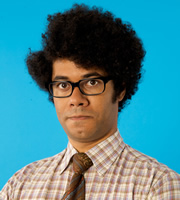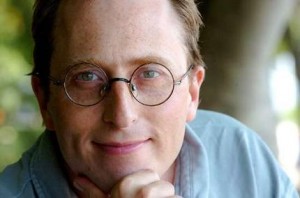What's missing from geek culture
The geeks are inheriting the Earth. BBC News magazine this week explores how geeks and nerds are no longer the marginalised losers they once were. Now, it's hip to be geeky:
Things have changed since the 1984 film, Revenge of the Nerds. The Social Network in 2010 came in a very different social milieu. Today when people think of "geeks" and "nerds" they might very well name the likes of Bill Gates, Steve Jobs and Mark Zuckerberg - people whose imagination and grasp of the technical made them billions. New York Times blogger and geeky statistician Nate Silver has been hailed as an unexpected star of the US presidential election after correctly predicting the outcome. "Memo to wannabe presidents: hire geeks, not pundits," advises this week's New Scientist magazine. A slew of comedies over the past few years have had geeks as heroes, such as Tim Bisley - the comics, video game and Star Wars-obsessive of Spaced - and Sheldon Cooper, the precocious physicist of The Big Bang Theory.
One might add that geek authors like Jon Ronson and Malcolm Gladwell now top the best-seller list, geek chefs like Hester Blumenthal are globally celebrated. In TV, the era of rugged heroes like MacGyver, Knightrider or BA Baracas is over - almost all our TV heroes are geeks, from House to Holmes, from Doctor Who to the loveable wonks of the West Wing. Really, the geek musical 'Loserville' is mis-named: does anyone think geeks are losers any more? They're the new elite.
But what exactly is a geek? Let's try and define the contemporary cultural type.
They sometimes wear glasses
They are probably above-average intelligence
They are perhaps slightly obsessive in their interests
They are likely to be mathletes, or physics buffs, or tech-heads and hackers, although they could also be evidence-based policy wonks

They are likely to get excited by machines or systems
They are likely to say ‘cool’ and ‘awesome’ a lot. They have an endearingly goofy enthusiasm for their obsessions
They probably like sci-fi, fantasy and superhero books, TV, comics, films and computer games
They are typically portrayed as somewhat lacking in social graces, and perhaps being somewhere on the autism spectrum
They are more likely to be boys than girls
They may have been a bit of an outsider or loser at school, but now, in their 20s or 30s, in the brave new knowledge economy, they make their fortune, get the cheerleader, and inherit the earth.
They are likely to be atheist / Skeptic
There is much to like about the rise of the geek. Our society is, on the whole, scientifically illiterate, which is the main reason we’re not taking climate change seriously. So we need more geeks - to take the issue seriously, and to invent ways for us to cope with it. Plus geeks invent cool stuff that we now all use, like iPhones or Facebook. Thank you geeks! And, in the US, geek-skeptics are brave insurgents against the tyranny of the religious right, symbolised for me in the heroic stand of Nate Silver, the evidence-based pollster, against the religious faith of Romney and his team that they would win. We need more geek politics.
Nonetheless, I don’t think of myself as a geek, and don’t want to jump on the geek bandwagon, even though I tick several of the geek boxes (glasses, love of ideas, social awkwardness etc). I think this is because I’m from a humanities background, rather than sciences. I studied English Literature at university, and now work as a journalist writing about philosophy, and even though my arts and humanities friends are on the whole pretty geeky (in the sense of being fairly cerebral) none of us self-identify as ‘geeks’.
I think that’s because we wouldn't think of ourselves as being geeky in the sense of emotionally challenged or awkward about feelings or social interactions. On the contrary, arts grads like to think they're fairly emotionally self-aware and relatively socially-competent. To be a good arts and humanities scholar, to some extent you have to be emotionally intelligent, I think. You have to be interested not just in ideas, but in feelings, in self-knowledge, and empathy for the experiences and world-views of others. And you're trained to appreciate culture and art which intelligently explores people’s subjective experiences and emotions. This may be why girls are good at it - according to the OECD, two thirds of arts grads are women, and three quarters of health and welfare graduates. In the sciences, by contrast, 60% of graduates are men (check out this handy graph from The Economist:)

I like a lot of geek culture - fantasy like Lord of the Rings or Game of Thrones, science fiction like Philip K. Dick, superhero movies like X-Men, Avengers Assemble, Dark Knight and so on. I'm a huge fan of Spaced - although since Simon Pegg stopped working with Jessica Hynes his work has become more geeky and less emotionally interesting. But in general, geek culture is missing a lot. At its worst, it is emotionally flat, autistic even, replacing deep emotional experience with techno FX - think of the dire dialogue of James Cameron movies, or the appalling, almost robotic, love scenes between Anakin and Padme in George Lucas’ Star Wars, or the techno-autism of Transformers and Battleships. There can be something infantile about geek culture - an obsession with childish things, like the toy or the comic or the computer-game, seal-wrapped and never opened, as if trying to preserve the innocence of childhood before adulthood came with all its confusing and messy feelings and interactions.
I find it strange that the Skeptic movement, which prides itself on being the ‘cognitive elite’ (as Christopher Hitchens put it), should be so closely entwined with fan-boy culture (Skeptics In the Pub originally grew out of a science fiction meet-up, for example; and there are now Skeptic mini-events within some big comic and sci-fi conventions). Because you couldn’t say that comic book culture is particularly artistically or emotionally advanced. Quite the opposite. Even the very best of it - Alan Moore, say - is not that emotionally sophisticated, compared to a 19th-century novel for example. I know Alan Moore has a great reputation, but honestly, V for Vendetta is not that good. From Hell is pretty infantile. Even the Watchmen is only good in comparison with most other superhero comics. Compared to Middlemarch, say, it's pretty silly stuff. So why should the 'cognitive elite' be so into bad art?
One speculative answer is that Skeptics are drawn to fantasy, sci-fi and superhero stories because they are a substitute for the common myths of religion, which Skeptics have rejected. Comic book culture draws heavily on old animist myths, folklore, magic and esoterica, and lets Skeptics / geeks find an emotional outlet in these myths, but without having to sign up to any ridiculous superstitions or obey a hierarchy of priests. It gives them a common mythology to bond over: instead of knowing the chapter and verse of the Bible, they recite the issue and page number on which the Silver Surfer first appeared. But it’s a disposable mythology, an irreverent one, half-serious half-mocking.
But still, comic book culture isn’t on the whole that deep or emotionally intelligent. I wrote a long essay looking at the links between superhero stories and old animist myths, and I did a lot of research on comic book culture. I watched a lot of superhero movies, read a lot of superhero comics. And by the end, I was sick of it. It’s just not that emotionally sophisticated or interesting, with the exception of the films of Haruki Murakami.
Again, I ask: if geeks are the cognitive elite, why aren’t they more into great culture, rather than comic books? Are they perhaps a cognitive elite, but emotionally challenged? (Christopher Hitchens was, perhaps, an exception among Skeptics in the sophistication of his cultural tastes - but then he was from a humanities background. He was no scientist.)
Do geeks have an emotional deficit, and is this why they often fail to have any appreciation for religion? A more intelligent, cultured and well-rounded Skeptic, like William James for example, recognises that religious traditions have interesting things to say to us about humans' emotional experiences, and that many of our most scientifically credible ways to transform emotions come from religions - meditation, from Buddhism; or CBT, from Stoicism. Richard Dawkins is completely uninterested in that, because ultimately he is not interested in feelings, he is interested in facts. By his own empirical standards, there is no such thing as love - you can't measure it, you can't prove it exists, therefore it doesn't.
So why is geek culture so cognitively-sophisticated and emotionally-challenged? Here's a very speculative and non-evidence-based attempt at an answer. James Flynn, the leading IQ researcher, argues that our IQs have been rising sharply over the last century because we have been forced, as a species, to acquire what he calls 'scientific spectacles', or the ability to think hypothetically, conceptually and systemically. But perhaps this cognitive transformation came at a great emotional cost, and is the reason for the dramatic rise in autism, particularly among men. Perhaps that's the dark side of the rise of geek culture. Well, it's just a theory - what do you expect of an arts graduate...
What also turns me off about geek culture is its celebration of its own intelligence. I find that gauche, just as I find Mensa gauche and lacking in social conscience. It's a sort of 'nuh nuh, we're smart and the rest of the world is dumb' attitude. It ignores the social privilege and education that enables geeks to be smart. Too often, it translates in reality into affluent people mocking poor people for their ridiculous belief in things like astrology or psychics. Well, if you were at the bottom of society maybe you would have an emotional need for God as well. Geek culture can also sometimes translate into men laughing at women for not being geeks - think of the dumb blonde in The Big Bang Theory, or the dumb brunette in the IT Crowd, or the whole weird internet argument about 'fake geek girls'.
Of course one could equally weigh in to the ranks of humanities graduates for their scientific illiteracy and their tendency to cling on to very bad ideas like, say, psychoanalysis, a pseudo-scientific theory which today only survives among humanities scholars, and the French. One could criticise humanities graduates for adding nothing much of value to the world in the last 30 years, while scientists are still making great advances in particle physics, genetic biology, nanotechnology, and so on. Where are the great novels, the great paintings, the great symphonies, the great ideas? Pushed to the margins of culture, the arts and humanities graduate ends up turning their back on the world of evidence and instead cultivating and savouring their precious emotions. In extremis, they become fey aesthetes, melancholy, backward-looking, out-of-joint with the modern world. They become hipsters. If I had to choose between a geek and a hipster, give me a geek any day of the week. Geeks may be emotionally-challenged but at least they invent something other than a electro-folk album with a fucking polaroid photo on the cover.
Nonetheless, would it not be great to combine these cultures, to combine the geek’s cognitive intelligence, love of science and respect for evidence, with the emotional intelligence and cultural sophistication of the arts and humanities graduate? That's what some Skeptics manage to do - like Jon Ronson for example, or Brian Eno, or Oliver Sacks. It's what Jonah Lehrer was trying to do: forge a third culture of culturally and emotionally-sophisticated geekdom. Come back Jonah, all is forgiven.

















